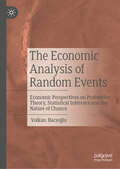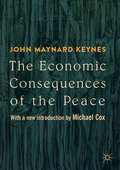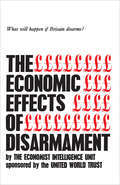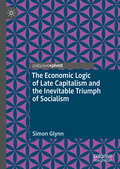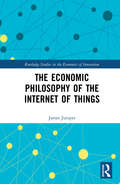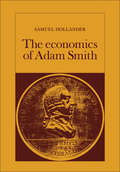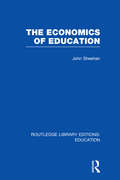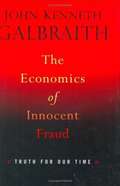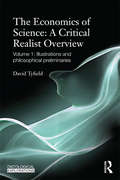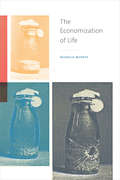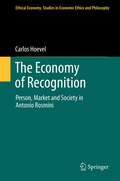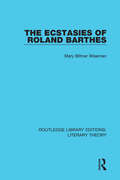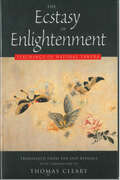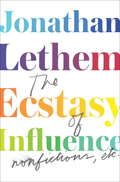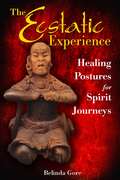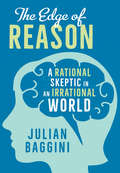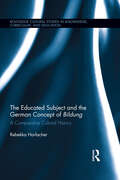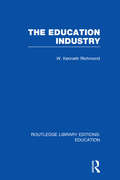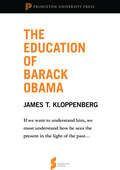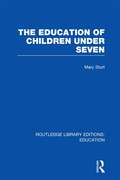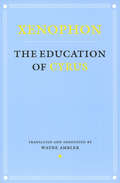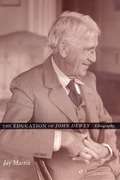- Table View
- List View
The Economic Analysis of Random Events: Economic Perspectives on Probability Theory, Statistical Inference and the Nature of Chance
by Volkan HacıoğluThis book investigates applications of probability theory to random events from an economic standpoint and considers how economics can deal with uncertainty in today’s world. As such the nature of chance and probability will be discussed with examples taken from the theoretical literature in probability and the history of economic thought, as well as real-life events.Chapters cover the nature of randomness and the element of chance, the concepts of both hidden costs and opportunity costs, the economic effect of human action, the randomness of economic events, random walk hypotheses and observable and unobservable phenomena. It situates the discussion in John Maynard Keynes’ and Ronald Fisher’s seminal works on probability, as well as introducing key tenets of probability theory and how these can be applied to economic events. The book considers the relationship between artificial intelligence and economic events, the role of big data, and international examples fromdifferent economic systems and how these can be evaluated. It also introduces a multidisciplinary exploration of other social sciences and how they deal with uncertainty, to assess the extent to which it is possible to apply probability theory to economic events which are by nature erratic and uncertain.This book will be of interest to researchers and students in economics, statistics, and those in the social sciences interested in questions of randomness and chance.
The Economic Consequences of the Peace: With a new introduction by Michael Cox (The\best Sellers Of 1920 Ser.)
by John Maynard KeynesFirst published in December 1919, this global bestseller attacking those who had made the peace in Paris after the First World War, sparked immediate controversy. It also made John Maynard Keynes famous overnight and soon came to define how people around the world viewed the Versailles Peace Treaty. In Germany the book, which argued against reparations, was greeted with enthusiasm; in France with dismay; and in the US as ammunition that could be (and was) used against Woodrow Wilson in his ultimately unsuccessful bid to sell the League of Nations to an increasingly sceptical American public. Meanwhile in his own country the book provoked outrage amongst establishment critics – Keynes was even refused membership of the prestigious British Academy – while admirers from Winston Churchill to the founders of the LSE, Sidney and Beatrice Webb, went on to praise Keynes for his wisdom and humanity. Keynes may have written what he thought was a reasoned critique of the economics of the peace settlement. In effect, he had penned a political bombshell whose key arguments are still being debated today. The Economic Consequences of the Peace is now reissued by Keynes’ publisher of choice with a new introduction from Michael Cox, one of the major figures in the field of International Relations today. Scholarly yet engaged and readable, Cox’s introduction to the work – written a century after the book first hit the headlines – critically appraises Keynes' polemic contextualising and bringing to life the text for a new generation of scholars and students of IR, IPE, Politics and History. The original text and this authoritative introduction provide essential reading for anyone who wishes to understand the tragedy that was the twentieth century; why making peace with former enemies can be just as hard as winning a war against them; and how and why ideas really do matter.
The Economic Effects of Disarmament: What will happen if Britain disarms?
by The Economist Intelligence UnitThis study, sponsored by the United World Trust, is the most detailed work to have been published on the results of disarmament on the British economy. It examines the consequences of the withdrawal of defence expenditures on industry and employment, and suggests how defence spending could be replaced in order to create new civil demand. The book provides precise and objective statistical analysis, which is much needed in this field. Both method and conclusions will be of interest in all countries to those concerned with public policy and the future of mankind.
The Economic Logic of Late Capitalism and the Inevitable Triumph of Socialism
by Simon GlynnBeginning with the economic meltdown of 2007/8, this book shows that the predatory mortgage lending and overleveraging—which is to say, the overextension of credit—which precipitated The Great Recession was a response to a crisis of overproduction reflective of an unavoidable contradiction at the heart of competitive capitalism. This contradiction, in addition to portending capitalism’s inevitable ultimate demise, invites both a pragmatic and moral comparison of (US) capitalism with (Chinese) socialism. Simon V. Glynn provides a critique of political economy and an analysis of the economic logic of capitalism, pointing to the inevitable triumph of socialism.
The Economic Philosophy of the Internet of Things (Routledge Studies in the Economics of Innovation)
by James JuniperTo properly understand the nature of the digital economy we need to investigate the phenomenon of a "ubiquitous computing system" (UCS). As defined by Robin Milner, this notion implies the following characteristics: (i) it will continually make decisions hitherto made by us; (ii) it will be vast, maybe 100 times today’s systems; (iii) it must continually adapt, on-line, to new requirements; and, (iv) individual UCSs will interact with one another. This book argues that neoclassical approaches to modelling economic behaviour based on optimal control by "representative-agents" are ill-suited to a world typified by concurrency, decentralized control, and interaction. To this end, it argues for the development of new, process-based approaches to analysis, modelling, and simulation. The book provides the context—both philosophical and mathematical—for the construction and application of new, rigorous, and meaningful analytical tools. In terms of social theory, it adopts a Post-Cognitivist approach, the elements of which include the nature philosophy of Schelling, Marx’s critique of political economy, Peircean Pragmatism, Whitehead’s process philosophy, and Merleau-Ponty’s phenomenology of the flesh, along with cognitive scientific notions of embodied cognition and neural Darwinism, as well as more questionable notions of artificial intelligence that are encompassed by the rubric of "perception-and-action-without-intelligence".
The Economics of Adam Smith
by Samuel HollanderThe renewed interest in the works of the great classical economists reflects in part a recognition that there is still much to be learned from them about the operation of the economy. This volume is the first in a series of four in which Professor Hollander will provide an analytical and critical assessment of the thought of the British school of classical economists; later volumes will elucidate the thought of Ricardo and Malthus, Mill, and Marx. This study relates Smith's theoretical position to contemporary history and economic practice. It pays particular attention to Smith's vision of the process of industrialization during the mid-eighteenth century, his approach to British colonial policies, and his view of the desirability of economic development. Coming in time for the bicentennial celebrations of The Wealth of Nations, this work should interest all economists with a sense of the evolution and purpose of their discipline, and should commend itself as a detailed and careful reinterpretation of what Adam Smith was thinking about. One authoritative reader has called it: 'one of the most distinguished essays in the history of economic thought of the last quarter century.' (Studies in Classical Political Economy)
The Economics of Centralism and Local Autonomy
by Phillip J. BrysonA comparative analysis of the process of public sector transition from central planning to market democracy. It is the story of the difficulties and complexities of moving to a system of greater autonomy for the subnational governments of the Czech and Slovak Republics, including the future of fiscal policies after the global recession.
The Economics of Education (Routledge Library Editions: Education)
by John SheehanThis book is a survey of the principal aspects of the economics of education, such as the demand for education as consumption and as an investment, good education and economic growth, education and manpower needs, and the finance of education. In some cases in recent years, economic theory has been applied to educational problems in order to gain an insight into the workings of the educational system. The result has been a certain amount of confusion and distrust among teachers and educationists: confusion because some theoretical aspects are not easily understood and distrust of the economist’s intrusion into educational policy-making. This book overcomes these problems by making minimal demands on prior knowledge of economics and by emphasizing the limitations of economic analysis applied to policy matters.
The Economics of Innocent Fraud: Truth for Our Time
by John Kenneth GalbraithThe primary aspect of the "fraud" of the American economy that Galbraith (emeritus, economics, Harvard U.) criticizes is the false pretense of shareholder control over corporations, when in fact all real power has shifted to corporate managers. Contradicting conventional wisdom, or "approved belief" in his words, he denies the distinction between the private and public sectors, describing how the managerial class has unprecedented power in the economy's public sector, including major influence over important policies of war or peace. In the end, the continuing references to an impersonal market are "a not wholly innocent fraud."
The Economics of Science: Volume 1: Illustrations and Philosophical Preliminaries
by David TyfieldDramatic and controversial changes in the funding of science over the past two decades, towards its increasing commercialization, have stimulated a huge literature trying to set out an "economics of science". Whether broadly in favour or against these changes, the vast majority of these frameworks employ ahistorical analyses that cannot conceptualise, let alone address, the questions of "why have these changes occurred?" and "why now?" Nor, therefore, can they offer much insight into the crucial question of future trends. Given the growing importance of science and innovation in an age of both a globalizing knowledge-based economy (itself in crisis) and enormous challenges that demand scientific and technological responses, these are significant gaps in our understanding of important contemporary social processes. This book argues that the fundamental underlying problem in all cases is the ontological shallowness of these theories, which can only be remedied by attention to ontological presuppositions. Conversely, a critical realist approach affords the integration of a realist political economy into the analysis of the economics of science that does afford explicit attention to these crucial questions; a ‘cultural political economy of research and innovation’ (CPERI). Accordingly, the book sets out an introduction to the existing literature on the economics of science together with novel discussion of the field from a critical realist perspective. In arguing thus across levels of abstraction, however, the book also explores how concerted engagement with substantive social enquiry and theoretical debate develops and strengthens critical realism as a philosophical project, rather than simply ‘applying’ it. Divided into two volumes, in this first volume the book explores the ‘top’ and ‘tail’ of the argument, regarding substantive and philosophical aspects. Starting with substantive illustrations, we explore the social challenges associated with the contemporary commercialization of science and the movement towards a knowledge-based bio-economy. Having shown the explanatory benefits of assuming a realist political economy perspective, the book then turns to the task of reconstructing and justifying that theoretical perspective. True to the overall argument regarding attention to ontological presuppositions, this starts with critical realism’s critique of mainstream economics but also develops critical realism itself towards what may be called a ‘transcendental constructivism’.
The Economization of Life
by Michelle MurphyWhat is a life worth? In the wake of eugenics, new quantitative racist practices that valued life for the sake of economic futures flourished. In The Economization of Life, Michelle Murphy provocatively describes the twentieth-century rise of infrastructures of calculation and experiment aimed at governing population for the sake of national economy, pinpointing the spread of a potent biopolitical logic: some must not be born so that others might live more prosperously. Resituating the history of postcolonial neoliberal technique in expert circuits between the United States and Bangladesh, Murphy traces the methods and imaginaries through which family planning calculated lives not worth living, lives not worth saving, and lives not worth being born. The resulting archive of thick data transmuted into financialized “Invest in a Girl” campaigns that reframed survival as a question of human capital. The book challenges readers to reject the economy as our collective container and to refuse population as a term of reproductive justice.
The Economy of Recognition
by Carlos HoevelIntroducing an alternative philosophical foundation to the study of economics, this book explains and adopts the perspective of the Italian philosopher Antonio Rosmini (1797-1855), whose interpretation of economic action was fundamentally at odds with the prevailing and all-conquering utilitarianism of modernity. Rosmini, one of the most important Italian and Catholic philosophers of the modern age, eschewed the traditional concepts of subjectivism and individualism at the core of the utilitarian thesis, prefiguring today's critique of 'autistic economics' with his assertion that micro-economic formulae consecrating the 'maximization of utility' derive not from scientific principles or even hypotheses, but from uncritically adopted philosophical ideas. It was an assault on the determinism he perceived as the fatal flaw in accepted economic theory. Rosmini's notion of human and economic action, based on human beings' 'personal' capacities for objective knowledge, truth recognition, moral goodness and happiness, deeply transform the meaning of central economic activities such as labour, wealth creation and consumption, and become crucial factors in any analysis of the operation of the economy. After introducing the fundamentals of Rosmini's thought, the author details the theoretical and institutional features of utilitarian economics, tracing their influence on social norms. He juxtaposes these with Rosmini's alternative philosophy which places the concept of social justice at its heart, and which attempts to establish a framework for relations between the public and private realms. The contemporary case is then made for adopting Rosmini's principles, thus changing an economic paradigm widely held to be unassailable. The fruit of unprecedented and systematic research on Rosmini's economic ideas, this volume offers a detailed conceptual framework to guide alternative approaches to conventional neoclassical economics.
The Ecstasies of Roland Barthes (Routledge Library Editions: Literary Theory #26)
by Mary Bittner WisemanIn this book, first published in 1989, Mary Bittner Wiseman interprets Roland Barthes’s experiments as efforts to reposition the human subject with respect to language and to time in order to let the subject escape from the language of a particular culture and the present time. With her insistent pushing against the boundaries of our standard academic assumptions, Mary Bittner Wiseman succeeds in interpreting Barthes’s effort to join the traditional and the new. This title will be of interest to students of literature and philosophy.
The Ecstasies of Roland Barthes (Routledge Library Editions: Literary Theory)
by Mary Bittner WisemanIn this book, first published in 1989, Mary Bittner Wiseman interprets Roland Barthes’s experiments as efforts to reposition the human subject with respect to language and to time in order to let the subject escape from the language of a particular culture and the present time. With her insistent pushing against the boundaries of our standard academic assumptions, Mary Bittner Wiseman succeeds in interpreting Barthes’s effort to join the traditional and the new. This title will be of interest to students of literature and philosophy.
The Ecstasy of Enlightenment: Teachings of Natural Tantra
by Thomas ClearyThe Ecstasy of Enlightenment is an inside look at the spiritual world of Tantra--one of the most sophisticated, alluring, and controversial forms of Buddhism. Cleary unlocks the mysteries of the Carya-Giti, a collections of teachings by more than twenty famous Siddhas, or Tantric adepts, who lived during the illustrius Pala dynasty of old Bengal. These teachings emanate from one of the most dynamic sources of international Buddhism, at the height of its religious development, and as such, they are completely nonsectarian. Particularly noteworth is Cleary's demonstration of the parallels between Tantric Buddhism in Old Bengal and the original Zen Buddhism of China.
The Ecstasy of Influence
by Jonathan LethemWhat's a novelist supposed to do with contemporary culture? And what's contemporary culture supposed to do with novelists? InThe Ecstasy of Influence, Jonathan Lethem, tangling with what he calls the 'white elephant' role of the writer as public intellectual, arrives at an astonishing range of answers. A constellation of previously published pieces and new essays as provocative and idiosyncratic as any he's written, this volume sheds light on an array of topics from sex in cinema to drugs, graffiti, Bob Dylan, cyberculture, 9/11, book touring and Marlon Brando. Then there are investigations of a shelf's worth of his literary models and contemporaries: Norman Mailer, Philip K. Dick, Bret Easton Ellis, James Wood, and others. And, writing about Brooklyn, his father, and his sojourn through two decades of writing, one of the greats of contemporary American literature sheds an equally strong light on himself. Funny and unfettered,The Ecstasy of Influencesimmers with direct challenges to conventional wisdom and deep insights into the kaleidoscopic nature of artistic vision, the primacy of the writer in the cultural marketplace, and the way the author's own experiences have fuelled his creative passions.
The Ecstatic Experience: Healing Postures for Spirit Journeys
by Belinda GoreTrance-inducing postures for shamanic journeying, initiation, healing, divination, and transformation of the soul • Provides practices from Mayan, Egyptian, African, Native American, Sumerian, and other ancient and indigenous traditions • Shows how these practices can detoxify the energy body The human need for ecstasy--the ability to be free of the limitations of ordinary consciousness--is as imperative as the need for food. Renowned anthropologist Felicitas Goodman claimed that being deprived of ecstasy was the fundamental cause of all forms of addiction. Indigenous cultures and the civilizations of antiquity were aware of this and developed specific rituals to induce and channel trance energies to detoxify and nourish the subtle body in order to experience the ecstatic reality that gives life to matter. The body postures seen in ancient art from Mayan, Egyptian, African, Native American, Sumerian, and other ancient and indigenous traditions are a doorway to inducing this kind of ecstatic trance. People who assume these postures in a ritual context are able to experience expanded and transformative states of consciousness. Following up on the groundbreaking introduction of this practice in her first book, Ecstatic Body Postures, Belinda Gore provides a new series of 20 sacred postures and exercises that allow for a deeper understanding and utilization of these shamanic practices. She shows how to use the energy awakened by these practices for healing, shapeshifting, initiations into the mysteries of death and rebirth, divination, spirit journeying, and restoring balance to the cosmic patterns disrupted by destructive human activity.
The Edge of Reason: A Rational Skeptic in an Irrational World
by Julian BagginiAn urgent defense of reason, the essential method for resolving—or even discussing—divisive issues: &“A timely masterpiece.&”—Patricia S. Churchland, author of Touching a Nerve Reason, long held as the highest human achievement, is under siege. According to Aristotle, the capacity for reason sets us apart from other animals, yet today it has ceased to be a universally admired faculty. Rationality and reason have become political, disputed concepts, subject to easy dismissal. Julian Baggini argues eloquently that we must recover our reason and reassess its proper place, neither too highly exalted nor completely maligned. Rationality does not require a cold, sterile worldview—it simply involves the application of critical thinking wherever thinking is needed. Addressing such major areas of debate as religion, science, politics, psychology, and economics, the author calls for commitment to the notion of a &“community of reason,&” where disagreements are settled by debate and discussion, not brute force or political power. Baggini&’s insightful book celebrates the power of reason, our best hope—indeed our only hope—for dealing with the intractable quagmires of our time. &“The toxic gloating of &‘gut feelings,&’ hateful politics and heart-over-head attacks on good sense urgently need an antidote. Baggini has risen to the occasion…compelling.&”—Patricia S. Churchland, author of Conscience: The Origins of Moral Intuition
The Educated Subject and the German Concept of Bildung: A Comparative Cultural History (Routledge Cultural Studies in Knowledge, Curriculum, and Education #2)
by Rebekka HorlacherGerman education plays a huge role in the development of education sciences and modern universities internationally. It is influenced by the educational concept of Bildung, which defines Germany ‘s theoretical and curricular ventures. This concept is famously untranslatable into other languages and is often misinterpreted as education, instruction, training, upbringing and other terms which don’t encompass its cultural ambitions. Despite this hurdle, Bildung is now being recognized in current discussions of education issues such as standardization, teaching to the test, evidence-based policy and high stakes testing. This volume clears up the confusion and misunderstandings surrounding Bildung by examining the origins of the concept and how it has been applied throughout history. It paves the way for educators to fully understand and benefit from this model and all it has to offer.
The Education Industry (Routledge Library Editions: Education)
by W Kenneth RichmondIn one sense, education was always a service industry. This book examines the quality as well as the quantity of contemporary education as it answers the following questions: Are we getting value for money? What makes a good teacher? What sort of education do we want? In the UK in the twentieth century education grew while national income did not. Britain devoted more of its resources to education than any other European nation and yet the UK had the largest proportion of children leaving school at 15 and spent more on each university place than the USA. The author argues that far too little attention was paid to cost-effectiveness analysis and planning. He examines Swedish and American examples and concludes that we must seek and employ the common features of modern management – network analysis, operational research and organizational theory. He also argues that traditional education has to come to terms with the mounting pressures of new curricula and new media.
The Education of Barack Obama: From Reading Obama (Princeton Shorts #7)
by James T. KloppenbergIf you really want to know what makes Barack Obama tick, you need to understand his education. James T. Kloppenberg explains the rich American intellectual tradition that shapes Obama's beliefs and influences his actions--particularly his aversion to absolutes and his commitment to compromise. This look at Obama's education is a deeply rewarding education in itself. Princeton Shorts are brief selections taken from influential Princeton University Press books and produced exclusively in ebook format. Providing unmatched insight into important contemporary issues or timeless passages from classic works of the past, Princeton Shorts enable you to be an instant expert in a world where information is everywhere but quality is at a premium.
The Education of Children Under Seven (Routledge Library Editions: Education)
by Mary SturtThis book does not cover the whole field of Infants’ Teaching but is concerned mainly with general principles and matters which are open to the non-specialist. Some technical subjects such as Physical Education have been omitted but nonetheless the volume provides a thorough (if somewhat dated) introduction to early years education in the first half of the twentieth century.
The Education of Cyrus
by Xenophon Wayne AmblerXenophon's masterpiece, The Education of Cyrus, is a work that was admired by Machiavelli for its lessons on leadership. Also known as the Cyropaedia, this philosophical novel is loosely based on the accomplishments of Cyrus the Great, founder of the vast Persian Empire that later became the archrival of the Greeks in the classical age. It offers an extraordinary portrait of political ambition, talent, and their ultimate limits. The writings of Xenophon are increasingly recognized as important works of political philosophy. In The Education of Cyrus, Xenophon confronts the vexing problem of political instability by exploring the character and behavior of the ruler. Impressive though his successes are, however, Cyrus is also examined in the larger human context, in which love, honor, greed, revenge, folly, piety, and the search for wisdom all have important parts to play. Wayne Ambler's translation captures the charm and drama of the work while also achieving great accuracy. His introduction, annotations, and glossary help the reader to appreciate both the engaging story itself and the volume's contributions to philosophy.
The Education of John Dewey: A Biography
by Jay MartinBased on original sources, notably the vast collection of unpublished papers in the Center for Dewey Studies, this book tells the full story of the life and times of the eminent American philosopher, pragmatist, education reformer, and man of letters. His philosophy, Pragmatism, has been the distinctive American philosophy during the last fifty years and his work on education is still influential today.
The Education of John Dewey: A Biography
by Jay MartinDuring John Dewey's lifetime (1859-1952), one public opinion poll after another revealed that he was esteemed to be one of the ten most important thinkers in American history. His body of thought, conventionally identified by the shorthand word "Pragmatism," has been the distinctive American philosophy of the last fifty years. His work on education is famous worldwide and is still influential today, anticipating as it did the ascendance in contemporary American pedagogy of multiculturalism and independent thinking. His University of Chicago Laboratory School (founded in 1896) thrives still and is a model for schools worldwide, especially in emerging democracies. But how was this lifetime of thought enmeshed in Dewey's emotional experience, in his joys and sorrows as son and brother, husband and father, and in his political activism and spirituality? Acclaimed biographer Jay Martin recaptures the unity of Dewey's life and work, tracing important themes through the philosopher's childhood years, family history, religious experience, and influential friendships. Based on original sources, notably the vast collection of unpublished papers in the Center for Dewey Studies, this book tells the full story, for the first time, of the life and times of the eminent American philosopher, pragmatist, education reformer, and man of letters. In particular, The Education of John Dewey highlights the importance of the women in Dewey's life, especially his mother, wife, and daughters, but also others, including the reformer Jane Addams and the novelist Anzia Yezierska. A fitting tribute to a master thinker, Martin has rendered a tour de force portrait of a philosopher and social activist in full, seamlessly reintegrating Dewey's thought into both his personal life and the broader historical themes of his time.
